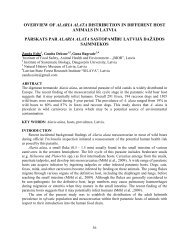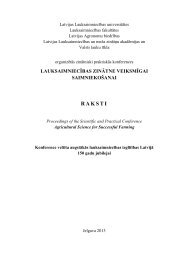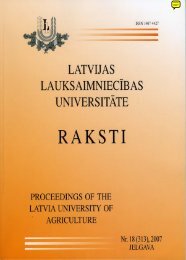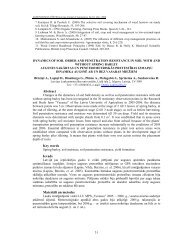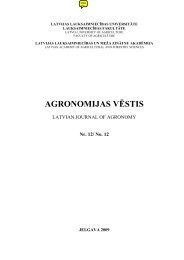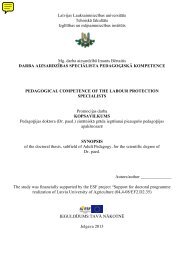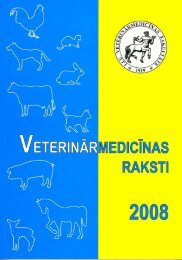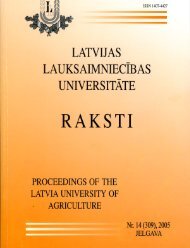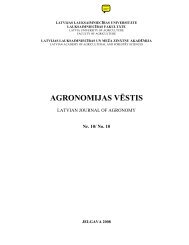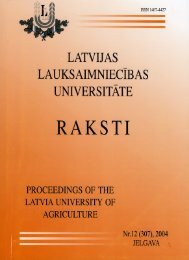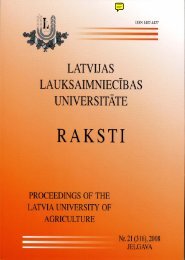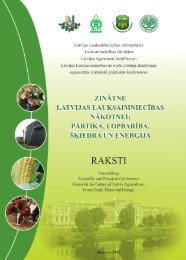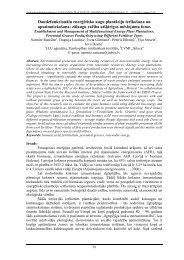Latvia University of Agriculture - Latvijas Lauksaimniecības ...
Latvia University of Agriculture - Latvijas Lauksaimniecības ...
Latvia University of Agriculture - Latvijas Lauksaimniecības ...
You also want an ePaper? Increase the reach of your titles
YUMPU automatically turns print PDFs into web optimized ePapers that Google loves.
M. Krūzmētra Development <strong>of</strong> Rural Sociology in <strong>Latvia</strong>Development <strong>of</strong> Rural Sociology in <strong>Latvia</strong>M. KrūzmētraDepartment <strong>of</strong> Sociology, Faculty <strong>of</strong> Social SciencesThe country as a research object. Rural sociology is one <strong>of</strong> the fields <strong>of</strong> sociologyhaving a rather long history if compared with the other fields. It firstly appeared in the1920s. Several factors determined the appearance <strong>of</strong> rural sociology in the pre-war<strong>Latvia</strong>.Firstly, for hundreds <strong>of</strong> years the <strong>Latvia</strong>ns have been a peasant nation, which hasalways had a disposition to land. Secondly, at that time the majority <strong>of</strong> <strong>Latvia</strong>n populationlived in the countryside, and the agricultural production was the main sector <strong>of</strong> nationaleconomy – the key producer <strong>of</strong> exports with which this country took part in the worldmarket. Thus the farmers and the countryside served as the values <strong>of</strong> economic life.Thirdly, <strong>Latvia</strong> was not an isolated territory, but it was closely connected with the rest<strong>of</strong> the world.Periods <strong>of</strong> research and main problems <strong>of</strong> research. From the present point <strong>of</strong>view it is possible to deal with several periods in the development <strong>of</strong> rural sociology in<strong>Latvia</strong>:1. the period up to 1940;2. the period <strong>of</strong> the 1970s -1980s;3. the period beginning with the 1990s and continuing up to nowadays.Each <strong>of</strong> these periods has its specific character as regards the organisation and theproblems due to the change <strong>of</strong> political, economic, and social conditions. The structure<strong>of</strong> scientists, their fields <strong>of</strong> activities and readiness for carrying out research in sociologychange as well.Main research problems in the first period: 1) formulation <strong>of</strong> the rural lifefeatures by comparing them with the urban life; 2) groupings <strong>of</strong> land owners before andafter the agrarian reform <strong>of</strong> 1922, which brought essential changes in the countryside<strong>of</strong> <strong>Latvia</strong>; 3) differences <strong>of</strong> inner groups <strong>of</strong> peasantry and also the peasantry situationin comparison with the other classes <strong>of</strong> the society; 4) additional work <strong>of</strong> farmers(smith, miller, craftsman etc.) and agriculture as an additional work too (income gainedworking in different state and municipal institutions, representatives <strong>of</strong> the so-calledfree pr<strong>of</strong>essions, or works in commerce etc.); and 5) wage labourers in agriculture,considered as a special group <strong>of</strong> rural population.Main research problems in the second period: 1) class and pr<strong>of</strong>essional structure<strong>of</strong> the rural society, particularly the groups connected with agricultural production; 2)agricultural work (contents and conditions <strong>of</strong> work, organisation <strong>of</strong> work, pr<strong>of</strong>essionalorientation to agricultural work, pr<strong>of</strong>essional training system, and other problemsconnected with this work); 3) analysis <strong>of</strong> living environment; 4) system <strong>of</strong> needs andthe level <strong>of</strong> satisfaction are also to be investigated; and 5) at the beginning <strong>of</strong> the1970s the work was started on development programmes for working collectives, alsoin the countryside, which were the first steps to consider the countryside as a holisticsystem.Main research problems in the third period: 1) new social groups – farmers,craftsmen, entrepreneurs, wage labourers; 2) new social structure <strong>of</strong> the society, thecentre <strong>of</strong> attention is peasantry (farmers); 3) processes <strong>of</strong> differentiation and stratification<strong>of</strong> the rural society; 4) more visible attention to territorial approach; 5) rural women,their role and status in the society and family – a more significant object in comparisonwith the previous period; 6) civil society formation process in the countryside – activities<strong>of</strong> local governments, non-governmental organisations, and other civic institutions;and 7) rural labour market and life-long learning problematic – one <strong>of</strong> the focuses <strong>of</strong>researchers.<strong>Latvia</strong> <strong>University</strong> <strong>of</strong> <strong>Agriculture</strong> as one <strong>of</strong> the research centres. As regardsthe organising aspect, the time from the 1970s may be considered as the activity <strong>of</strong>small separate groups in Riga Polytechnic Institute, <strong>Latvia</strong> State <strong>University</strong>, and <strong>Latvia</strong>Agricultural Academy. However, <strong>Latvia</strong> Agricultural Academy gradually becomes the mainresearch centre <strong>of</strong> rural sociology. Up to 1991 the guidance <strong>of</strong> the Rural section <strong>of</strong> the<strong>Latvia</strong> <strong>University</strong> <strong>of</strong> <strong>Agriculture</strong> – 70, 2009 179



